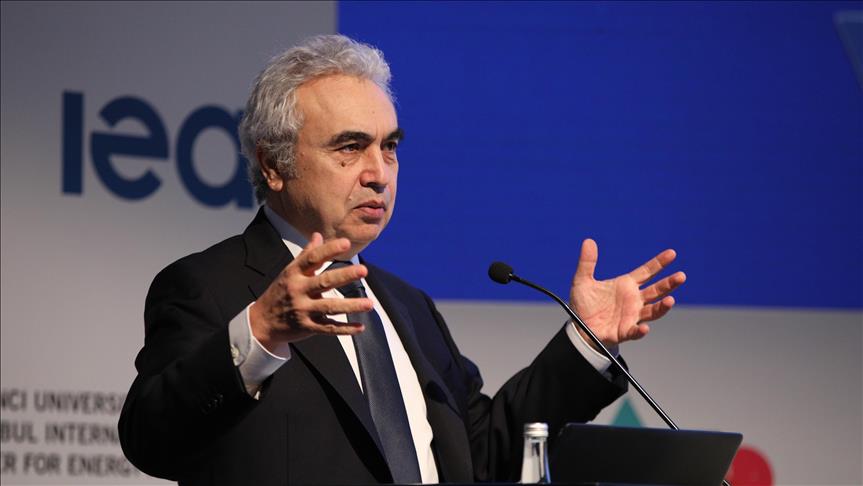Several Middle East oil-producing countries, whose economies are highly dependent on oil and gas revenues, are aware of the need to transition to clean energy and are trying to do so, Fatih Birol, head of International Energy Agency (IEA), told Anadolu Agency exclusively.
Birol received a lifetime achievement award on Monday at the major international energy industry conference ADIPEC hosted by the United Arab Emirates (UEA). The award was presented by the UAE Special Envoy for Climate Change, Sultan Ahmed Al Jaber in recognition of Birol’s long-standing work assessing the global energy sector and providing clarity on how it can adapt to the clean energy transition.
'I see this award as a very significant way of showing how oil producer countries are in a search of guidance for clean energy transition,' he said, adding that the decline in oil revenues in these countries will not only be felt economically but socially.
According to Carbon Tracker data, Iraq's fiscal dependence on oil and gas makes it the most vulnerable country with a share of the revenue from this sector reaching as much as 89%.
Other notable countries with high dependency rates on oil and gas revenue include Bahrain and Libya both at 72%, and Saudi Arabia at 69%. Around 67% of Kuwait's economic revenue is derived from oil and gas, while this sector accounts for 52% in the UAE.
He stressed the importance for these oil and gas producing countries to reduce their reliance on fossil fuels and rapidly shift to cleaner alternatives.
'More than at any other point in recent history, fundamental changes to the economic model of resource-rich countries look unavoidable. The future will look very different from the past,' Birol said.
He acknowledged that some oil producer countries are hesitant in taking steps against climate change but he argued that 'the global warming that is already affecting us all worldwide is especially treacherous for Middle Eastern and North African countries. Some are experiencing warming at a far higher rate than the global average. The region is today going through its worst drought in over 900 years.'
To kickstart the clean energy transition in the region, he said the IEA will initially work with the UAE to create a roadmap by 2050 focusing on clean energy transition, covering clean energy technologies including hydrogen, ammonia, carbon capture and storage.
He said Qatar, Oman, Egypt and Iraq, which also want to make the shift to clean technologies and have huge potential to do so, will also follow developments on this roadmap.
Birol stressed the significance of both Egypt and the UAE becoming more involved in the organization for the fight against climate change and clean energy transition, with Egypt’s plans to host the 27th session of the United Nations Conference of Parties (COP) next year while the UAE will host the 28th COP in 2023.
However, he affirmed that these countries need a clear strategy and political will to make the clean transition possible.
'Some countries have this vision. Sufficient finance should be channeled for the transition in these countries,' he concluded.
According to IEA data, clean energy investment in Middle East producer countries currently amounts to $16 billion annually, with the majority designated for clean electricity investments covering renewables, electricity networks and battery storage.
The share of the region's clean energy investments in global clean energy spending is around 2%, considerably below its share of the total energy demand of about 5%.
The IEA in its net zero emissions by 2050 scenario forecasted that investments need to increase 10 fold to around $130 billion in 2030 and 20 fold to $295 billion annually between 2030 and 2050.
By Nuran Erkul Kaya
Anadolu Agency
energy@aa.com.tr


